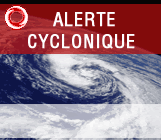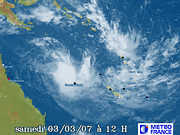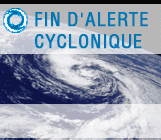This blog on New Caledonia is for those of you who ever wondered what life on a tiny island in the South Pacific might be like. Tired of bracing winter winds, the stress of an inner city or simply dreaming of a life change? This is a blog about what happens when, in the words of Yogi Berra, "you come to a fork in the road, [and] take it".
30 March 2007
28 March 2007
New Caledonia on High Alert: Cyclone Becky on the Way
 At 19:00 today New Caledonia was put on Cyclone Alert 1 (there are three levels of alert: pre-alert, 1 and 2). Apparently tropical cyclone Becky was 250 km north-northwest of Lifou at that time and travelling at 25 km per hour. It is predicted that she will hit the Loyalty Islands tonight or tomorrow morning.
At 19:00 today New Caledonia was put on Cyclone Alert 1 (there are three levels of alert: pre-alert, 1 and 2). Apparently tropical cyclone Becky was 250 km north-northwest of Lifou at that time and travelling at 25 km per hour. It is predicted that she will hit the Loyalty Islands tonight or tomorrow morning.All schools will be closed tomorrow and we are being encouraged to stay home with our extra bottles of water, candles and basic provisions.
More news will normally be available at 5:00 local time at Meteo France's Alerte cyclonique page.

Posted by
JHG
at
7:49 PM
2
comments
![]()
Labels: Lifou, Loyalty Islands, weather
26 March 2007
Ouvéa: The 1988 Massacre
Ouvéa was declared a military zone and all communication and transport was cut. More than 300 soldiers were flown to the island and Captain Philippe Legorjus, head of France's elite antiterrorist squad, began negotiations with the hostage takers. During attempts to secure the hostages' release, Legorjus was captured but was freed after coming to an agreement with the group's young leader, Alphonse Dianou, on a date of release for the hostages. It was set for after the presidential election.
On 4 May, three days before the election, Captain Legorjus had two guns and a set of handcuff keys smuggled into the cave. In what was code-named Opération Victor, the military then stormed the cave and reported 'at least 16' people dead, all of them Kanaks. The following day, the figure was revised to 21, including two gendarmes. Later, allegations were made that four of the Kanaks, including the leader, Dianou, and Waine Amossa, a 19-year-old who had been sent into the cave to deliver food, were killed after they had surrendered. It was also claimed that the military tortured and beat civilians from Goosana during the operation. The human rights group Amnesty International took up the case, and France's Minister for Defence later announced that 'acts contrary to military duty have unfortunately been committed'. One gendarme was suspended but no judicial action was taken.
After the cave assault, 32 Ouvéan prisoners, including Djubelly Wea, a local independence movement leader and FULK (Front Uni de Libération Kanak) supporter, were flown to France to face trial. This was despite a previous assurance from the French High Commissioner in New Caledonia that trials would be held in Noumea. Wea was eventually released and the others were given amnesty as part of the Accords de Matignon. Wea returned home to find that his elderly father had died shortly after the hostage crisis. His father had apparently been beater and left tied up in the sun by the military, and was soon regarded as the '20th victim' of the Ouvéa massacre."
Posted by
JHG
at
9:07 AM
4
comments
![]()
Labels: Loyalty Islands, Ouvéa
22 March 2007
Living in New Caledonia: The Pros and Cons
Pros:
- It feels like paradise every morning I wake up: everything is so beautiful, pleasant, and easy.
- The weather - almost always sunny and warm.
- The people - very kind, gentle and warm.
- The ease of life - there is no stress in New Caledonia.
- Living outside - this is a sports country, not unlike Australia. Everyone does sports!
- Great place for kids - they really blossom here. There are parks, activities, groups, lots of outside possibilities and water sports courses for the young.
- It is also easy to get outside Nouméa and see the island: there is lots to see and take advantage of!
- One is exposed to a new culture: the Melanesians. It is very eye-opening!
- An earlier post on the same topic: 7 things I love about living in New Caledonia.
- It is expensive, yes.
- Choices are limited in terms of commerce and health care.
- I find the culture somewhat sexist. As an example, I ran into difficulty getting electricity turned on, as my "husband" had to make the request.
- I don't always find that getting things done in New Caledonia is easy or efficient. For example, people still pay their bills in person here. There is no such thing as online banking.
- English-speaking books and films are few and far between - though there is an English-language library, some films in English, and active associations for English-speakers.
- It is hard for spouses to work here (as locals are hired first and foremost).
- One has to cope with strikes - like grocery stores go on strike, bakeries, gas stations, garbage collectors. It doesn't happen very often, but when it does, it can be slightly annoying.
Posted by
JHG
at
8:52 AM
25
comments
![]()
16 March 2007
Another Driver in our Midst
Speaking of Sophie Superstar (as she was called in her younger years), she's back from Europe and headed right into high school (lycée). The French only have three years of high school, unlike the four in the United States. She's doing great guns. She's had to specialise (as they all do in France at this age) and so will be doing more intense math and science - she wants to do a science specialisation instead of a literature one, for example. So far, so good. To balance things out, she is taking art as an option, along with German. We've already been to an art gallery (which I did not realise Nouméa even had) and her English teacher has asked her to help the other students in her class. Busy Sophie!
We're taking her out this evening to celebrate today's great win - and perhaps tomorrow she'll celebrate with friends. Bravo!
Posted by
JHG
at
4:14 PM
4
comments
![]()
Labels: Sophie
Wages in New Caledonia
With the cost of living being high in New Caledonia, I am often asked if the salaries are commiserate. How are people able to make it here - given that rent, food and clothing are all expensive?
The retirees receive their monthly pensions and then some. They are what we call "indexé". They can receive up to 20-40% more on top of their pensions. Again, this goes back to way back when when it took a week to get here by boat. France esteemed that those willing to travel to, and live in, such a faraway place should be recompensed for such a thing. There is some debate at the moment as to whether or not the indexation should be stopped (it costs France and its taxpayers a pretty penny) - or at least rewarded to those who have worked on the island. For you see, French citizens who come to retire here can receive such an indexation, never having worked here.
Lastly, there are the islanders (from Lifou, Maré and Ouvéa) who come to Nouméa to make a living. My hunch is that they carve out a life for themselves, but it is no picnic. Some of them live in the ghettos - thereby avoiding paying rent and electricity, so as to send more back home. They work as hard as they can and their kids generally stay back on the islands with the tribes. As there is little or no work on the islands, living and working in Nouméa is one of their only choices.
Methinks there is a fifth population - the Caldoches, the island's white local population. They own businesses and nice homes. They've been here a long time and have worked hard for all that they have. They send their kids to mainland France to get good educations and they invest in New Caledonia to keep it thriving.
Posted by
JHG
at
3:34 PM
8
comments
![]()
Labels: ** Most popular posts, Living in New Caledonia, Nouméa
13 March 2007
Cost of Living in New Caledonia
But another question he had was whether or not it really is expensive to live here. I'd written about the high cost of telecommunications here (and expensive bread), but I took another look at our expenses for 2006 and came up with this, for any of you who might be interested:
Average monthly expenses
(for a family of two adults, one teenager and one baby)
Automobile: Gasoline - 64,17 €
Automobile: Parking - 2,33 €
Bills: Cable tv - 83,83 €
Bills: Cell phone - 30,00 €
Bills: Electricity - 100,25 €
Bills: Internet service - 90,25 €
Bills: Newspaper - 4,00 €
Bills: Telephone - 48,42 €
Bills: Water & sewer - 75,00 €
Clothing - 92,75 €
Customs - 6,00 €
Dining out - 166,42 €
Groceries - 769,83 €
Healthcare - 172,75 €
Hobbies: outings - 200,00 €
Hobbies: movies/dvds - 20,00 €
Personal care - 50,00 €
Postage - 22,00 €
Rent (three-bedroom house, 165 m2) - 1500.00-2000,00 €
Want to see the prices in your local currency? Go to XE.com Universal Currency Converter to convert from euros ... and try not to scream when you see how much rent is (and reassure yourself - this is less than what it costs to live in a three-bedroom flat in central Paris!).
Posted by
JHG
at
2:45 PM
11
comments
![]()
Labels: ** Most popular posts, Living in New Caledonia, Nouméa
11 March 2007
La vie est belle !
Posted by
JHG
at
10:39 AM
1 comments
![]()
Labels: Pablo
07 March 2007
Tropical Depression Odette
 Some of you will be happy to learn that we do indeed have rain in paradise. It's been raining in Nouméa (and New Caledonia) for six days. Okay, this morning it let up a bit, but rain and thunderstorms are forecast to continue through to the weekend at least. Apparently, tropical depression Odette has come for an extended visit. Be assured: we are in no danger. We just have lots of rain.
Some of you will be happy to learn that we do indeed have rain in paradise. It's been raining in Nouméa (and New Caledonia) for six days. Okay, this morning it let up a bit, but rain and thunderstorms are forecast to continue through to the weekend at least. Apparently, tropical depression Odette has come for an extended visit. Be assured: we are in no danger. We just have lots of rain.Our Internet connection has gone down more than once with the rain and Pablo has grown a little stir crazy, but apart from that, it feels like we are in Brittany again. I remember thinking the rain in Paris was romantic when I first landed from sunny California ... it is all a matter of perspective.
As a side note, for those of you who are in France and who watch the weather on TF1, you can now see the weather in New Caledonia along with your usual weather forecast. You'll either love us or hate us ...
Posted by
JHG
at
10:16 AM
0
comments
![]()
Labels: weather
02 March 2007
Ouvéa: Bread Delivery
Posted by
JHG
at
10:26 AM
3
comments
![]()
Labels: Loyalty Islands, Ouvéa



